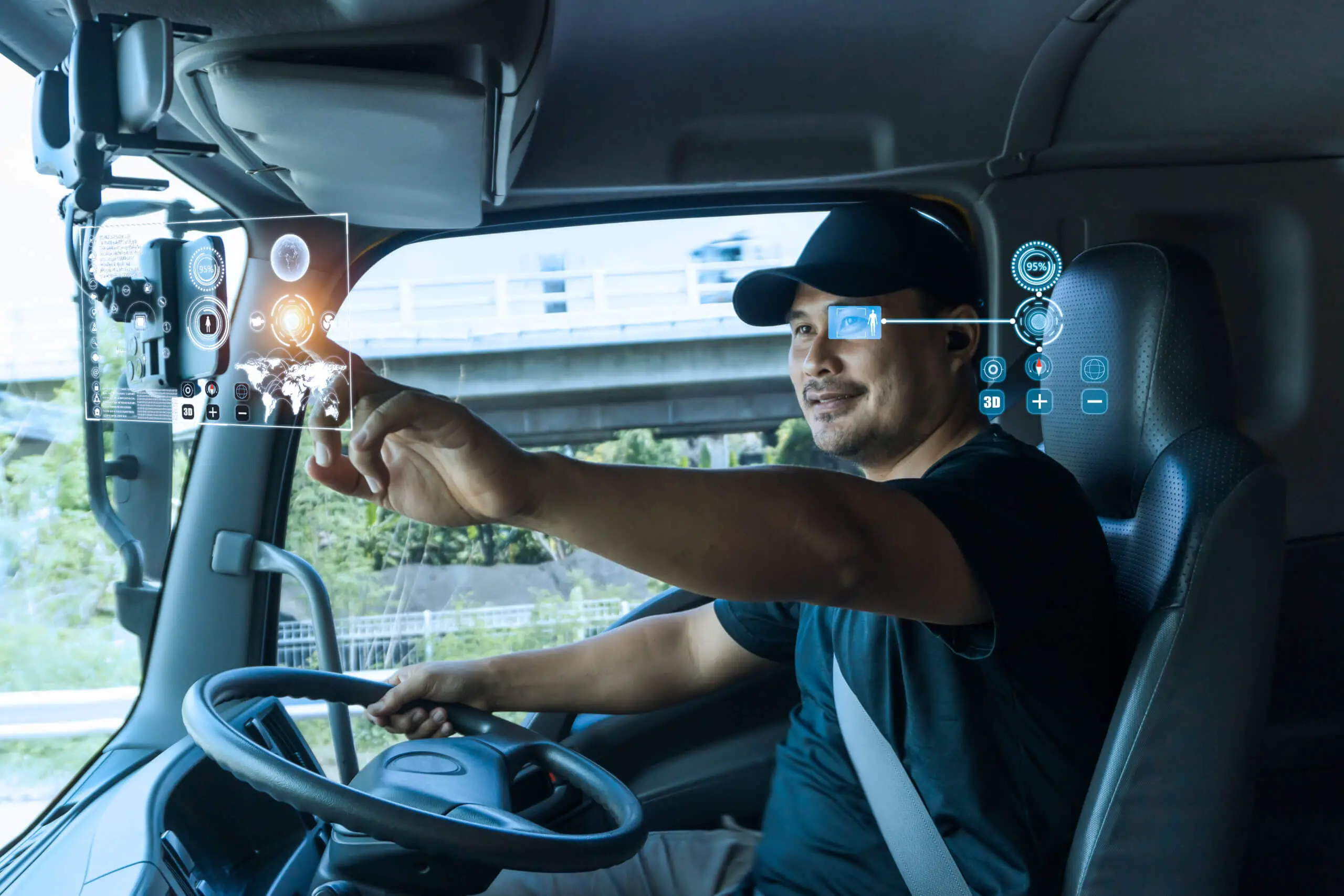The trucking companies confront several challenges, including a lack of drivers, rising fuel prices, and regulatory restrictions. Therefore, route optimization software is crucial for the trucking sector in the future. Commercial truck routing software for fleet industry is becoming a means of streamlining routes, lowering fuel costs, and boosting productivity.
The trucking sector will change in the future as a result of technology developments like platooning, automation, and electric trucks. Utilizing emerging technologies, such as AI and machine learning will become more advanced, which will enable fleet managers to design and dispatch routes more intelligently.
Overall, commercial truck routing software will be helpful to make sure that trucking companies stay competitive and profitable.

Truck drivers locate their position on digital map, realistically displayed on touch screen. concept Navigation technology, face detection, driver eye scan for safe transportation and delivery
Current Challenges Faced by Trucking Industry
The efficiency and profitability of the transportation industry are threatened by a number of challenges, here are some of them:
Shortage of drivers: The lack of skilled drivers in the trucking sector is affecting the sector's capacity to meet the escalating demand for transportation services.
Rising Fuel Costs: One of the major costs for trucking operations is fuel. Companies are finding it more difficult to maintain their profitability with the rising prices of fuel.
Regulatory Hurdles: The trucking industry is heavily regulated, and businesses are required to abide by several rules pertaining to safety, emissions, and service hours.
Infrastructure Challenges: Infrastructure issues are a major concern for the trucking business since they can affect both the safety of drivers and the effectiveness of the transportation system.
Environmental Issues: The trucking industry is under increasing pressure to cut emissions and embrace more environmentally friendly practices, which can be difficult for businesses to accomplish while retaining profitability.
Technological Changes: The trucking sector is going through a lot of technological changes right now, such as the development of autonomous trucks and digital logistics systems. For businesses to remain competitive in the market, they must adapt to these developments.
These are just a few of the difficulties the trucking industry is now dealing with. Innovative approaches and other advances in technology will be needed to address these difficulties.
Future of Route Optimization Software
As the industry continues to evolve, it is expected that software will advance and grow more sophisticated, making it more efficient and capable of route optimization. The market for route optimization software is anticipated to reach USD 12,416 million by 2030, at a CAGR of 11.56%.
Going ahead, let’s find out the future of route optimization software in detail:
1. Increased use of AI and machine learning
Route optimization software will increasingly rely on AI and machine learning as the trucking industry develops. This will enable the software to evaluate massive amounts of data to make better routing decisions, increase fuel efficiency, and decrease the number of empty miles driven.
2. Real-time updates
Drivers will receive real-time updates from route optimization algorithms about traffic conditions, the weather, and other variables that can influence routing choices. Drivers will be able to change their routes in real-time to cut down on delays and boost productivity.
3. Improved user interfaces
The future of the trucking industry is going to evolve through route optimization software with improved user interfaces. This will shorten the time and effort needed to manage shipments by enabling drivers and dispatchers to quickly and easily decide on a route.
4. Autonomous vehicles
Route planning software will need to be modified to cope with autonomous vehicles as their use becomes more prevalent. Software that can optimize routes for autonomous vehicles while taking into account variables like range and charging time will be needed for this.
These are just a handful of the improvements that route optimization software will likely experience in the future.

Morden city and smart transportation and intelligent communication network of things ,wireless connection technologies for business .
Benefits of Route Optimization Software
Trucking companies can benefit greatly from route optimization software, including cost savings, increased productivity, and improved safety.
By eliminating needless stops and cutting down on idle time, route optimization software assists businesses in consuming less fuel and spending less money.
It increases production by determining the fastest routes, cutting delivery times, and increasing overall efficiency.
Route optimization software increases safety by assisting drivers in avoiding collisions and hazardous road conditions, as well as by keeping track of driving habits to raise safety standards.
In the future, technological developments like artificial intelligence (AI) and machine learning will increase the efficiency of route optimization software, resulting in even larger cost reductions, efficiency gains, and safety advantages.
AI and machine learning will enable real-time route optimization and adaptation to changing road conditions, which will also improve predictive maintenance and decrease downtime.
As businesses continue to adopt these technologies, the advantages of route optimization software will be amplified in the future, resulting in a more sustainable and effective trucking industry.
Overall, route optimization software has many advantages, and these advantages will only increase in the future as technology develops and businesses continue to use these tools to streamline their processes.
Conclusion
Conclusively, route optimization software is crucial for the trucking business. This will become even more successful because of developments in AI and machine learning, which will increase cost savings, efficiency, and safety benefits. In the years to come, we may anticipate a more sustainable and effective trucking industry as the sector continues to implement these technologies.
Overall, technology is driving innovation and enabling improved efficiency and safety in transportation. To stay competitive in a market that is changing quickly, trucking companies must continue to embrace these innovations and keep on top of the curve as the industry develops.
